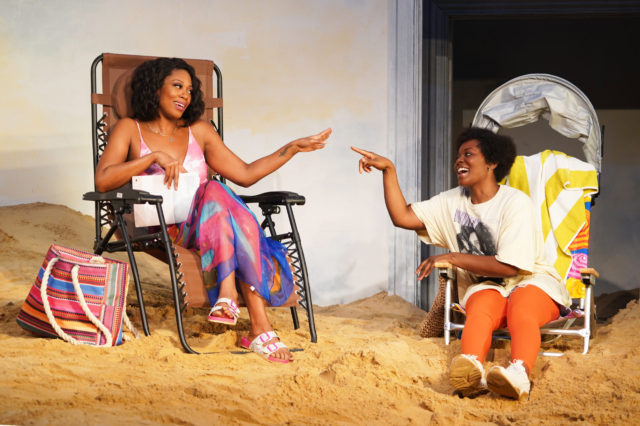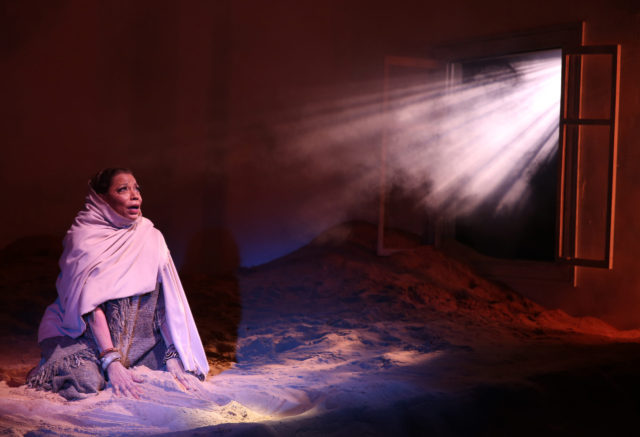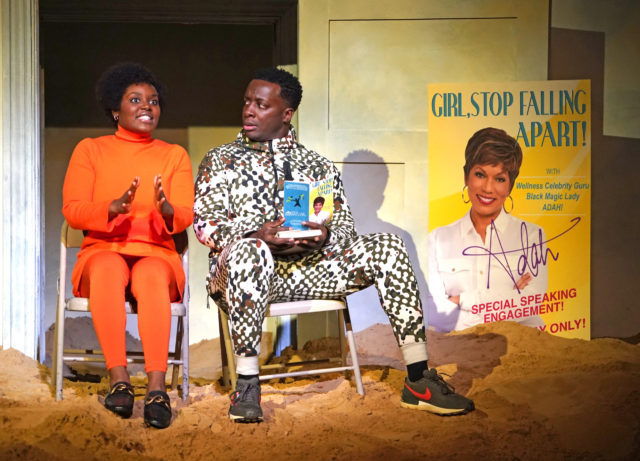
Odessa (Marinda Anderson) and Angela (Brittany Bellizeare) try to keep things together in sandblasted (photo by Carol Rosegg)
SANDBLASTED
Vineyard Theatre
Gertrude and Irving Dimson Theatre
108 East 15th St. between Union Square East & Irving Pl.
Tuesday – Sunday through March 13, $26.25-$103.95
www.vineyardtheatre.org
Charly Evon Simpson’s engaging, if undercooked, sandblasted is no mere day at the beach or breath of fresh air in a freezing cold winter, with Covid still upon us and masks necessary at the theater. The hundred-minute play, which opens today at the Vineyard, takes place on a stage filled with more than seventeen tons of sand, alternately representing the beach or the desert; there are doors in the back and stage right, a window stage left, and a ceiling of fluffy white clouds and blue sky. Matt Saunders’s set offers the characters warm and sunny relaxation, where they can sit in a chair and have a cold drink, as well as a space for unsteady traction, an arid, treacherous landscape. In both locales, Black women struggle to keep themselves together, literally and figuratively.
Thirtysomethings Angela (Brittany Bellizeare), a bundle of fear and anxiety, and the much cooler and hipper Odessa (Marinda Anderson) meet at the beach; brushing off sand, Odessa sees her left arm fall off. She is more disappointed than horrified; it turns out that women, particularly as they age, start losing pieces of their body. They are soon joined by the older and wiser Adah (Rolonda Watts), who offers perspective.
“I thought it would take a while longer for the larger parts of us to . . . to fall,” Angela says almost matter-of-factly. “Longer?” Adah asks. Angela replies, “Yeah, a lot of breaths, months of stewing, soaking, simmering, months of incubation. I thought it would take a large number of sleepless nights for a part so large to . . .” Adah says, “Just like you to trust in something like time and sense.” Angela concludes, “I just trust that time will get us, that time will outlive us.”

Rolonda Watts excels as a celebrity wellness guru in Vineyard/WP world premiere (photo by Carol Rosegg)
Adah is a famous celebrity wellness guru who may or may not have Black lady magic, supplying answers to many of the questions Black women have. When Angela mentions how inconvenient so much of their lives are, Adah explains, “But isn’t it always inconvenient? Isn’t it always the wrong place, wrong time?”
Angela and Odessa, a sort of Alpha and Omega themselves, believe it will take more than sun, tape, glue, spinach, and exercise to hold them together. Thinking that it might be easier to just hide her head in the sand, Angela says, “Sometimes I want to walk around in like one of those bubbles, just be a bubble walker.” Odessa responds, “No life that way, just a bubble life. What’s the point in living?” The allusion to Covid-19, which inequitably affects communities of color, is not lost on the audience. (And there are a few more to come.)
Angela’s hunk of a brother, Jamal (Andy Lucien), accompanies her to an Adah seminar entitled “Girls, stop falling apart!” but Adah doesn’t show up. Angela and Odessa decide to find her, hoping she can provide a cure; they set off on a journey seeking hope, understanding, and resolution, but it’s not going to be easy.
A coproduction with WP Theater, sandblasted evokes Samuel Beckett’s Happy Days and Waiting for Godot and Edward Albee’s Seascape and The Sandbox as well as Chiori Miyagawa’s America Dreaming, the 1994-95 Vineyard play that also took place on sand and dealt with otherness. Simpson’s (Behind the Sheet, Jump) writing is often poetic and works best when the story has a more existential, nonspecific nature, making references to skin color, grief, isolation, and systemic misogyny instead of putting them front and center.

Angela (Brittany Bellizeare) and her brother, Jamal (Andy Lucien), attend a seminar in sandblasted (photo by Carol Rosegg)
There are many beautiful, penetrating lines: “I think getting older isn’t about losing the fears you had as a kid. I think it is about having new fears that overtake them,” Angela theorizes. “Some say they don’t want to learn any new names, meet any new people, because then it is just another person to miss, to worry about, to grieve,” Odessa asserts. “I don’t know which of the many possible fights we’re in the middle of. Is the fight we should be fighting to heal? And no one else seems to know either,” Angela explains. And Odessa admits, “Some nights I think I’m the epitome of Black girl magic, and other nights I think I’m just another version of a magical negro and I wonder what it would be like to just live between the two.”
Anderson and Bellizeare make a classic comic duo, albeit with a very serious edge, as the fun and fancy-free Odessa and the tightly wound Angela, respectively, two women who might not have become friends at another time or another place. Watts, the longtime New York City television journalist and talk show host, is extraordinary as Adah, displaying an infectious confidence that glitters at every turn; she adds sparkle every time she’s onstage. Lucien does what he can as Jamal, a character who quickly becomes superfluous; I’m not sure he was necessary at all, save for providing a forced link between Angela and Odessa.
In her NYC debut, director Summer L. Williams can’t quite steady herself in the sand. The jumps back and forth in time are confusing, and several subplots never come full circle, falling away like body parts that are never reattached. In addition, Simpson can’t quite figure out how to end the show, which feels about ten or fifteen minutes too long; several of the last scenes feel extraneous, as they turn from the existential aspects of the story to provide more specific pathways for the future.
At one point, Angela talks about fulgurites, fragile tubes of glass that are formed when lightning strikes sand; some believe they have magical qualities. “I spent all this time being careful, treated myself like a fucking fulgurite for god’s sake,” Angela says. “So I’d live long, so I’d succeed, so I’d . . . and now this.” The resolution of the fulgurite thread in the play is too firm, too solid; some things are better left unsaid, onstage and on sand.